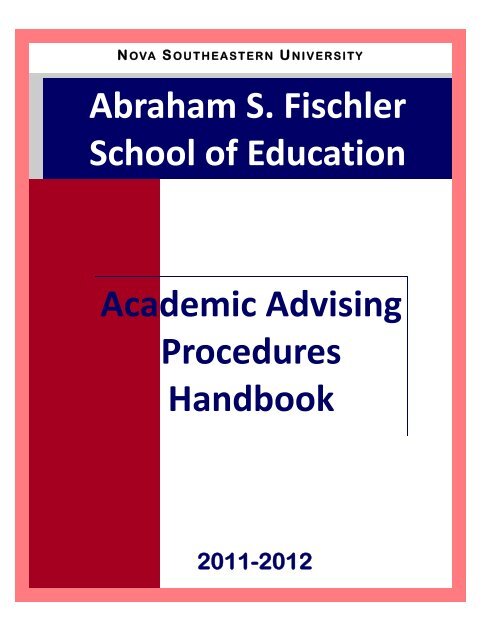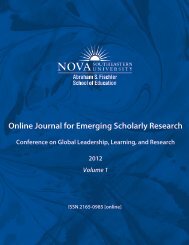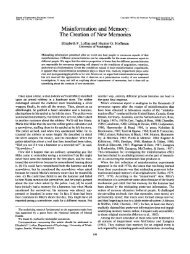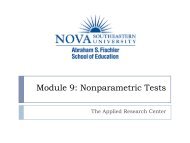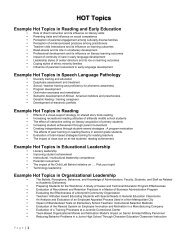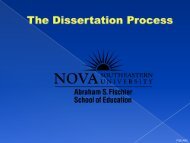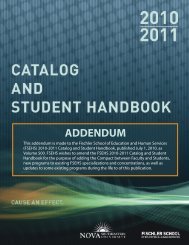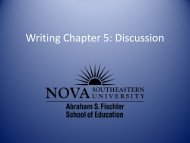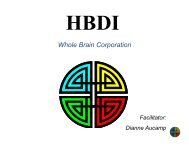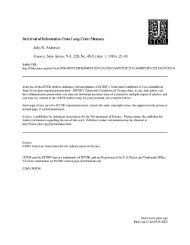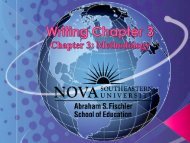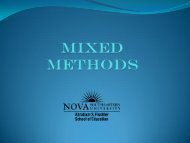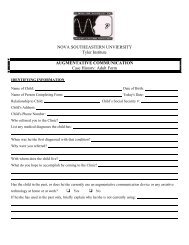Abraham S. Fischler School of Education Academic Advising ... - 1
Abraham S. Fischler School of Education Academic Advising ... - 1
Abraham S. Fischler School of Education Academic Advising ... - 1
Create successful ePaper yourself
Turn your PDF publications into a flip-book with our unique Google optimized e-Paper software.
N OVA SOUTHEASTERN UNIVERSITY<br />
<strong>Abraham</strong> S. <strong>Fischler</strong><br />
<strong>School</strong> <strong>of</strong> <strong>Education</strong><br />
<strong>Academic</strong> <strong>Advising</strong><br />
Procedures<br />
Handbook<br />
2011-2012
Page 1 <strong>of</strong> 18<br />
<strong>Fischler</strong> <strong>School</strong> <strong>of</strong> <strong>Education</strong><br />
ADVISEMENT SERVICES GENERAL DEPARTMENTAL PROCEDURES<br />
2011-2012<br />
Table <strong>of</strong> Contents<br />
NSU, FSE and Advisement Services Mission Statements<br />
<strong>Academic</strong> <strong>Advising</strong><br />
Admission Application Process<br />
Transfer <strong>of</strong> Credit Procedure<br />
Undergraduate Evaluations<br />
Graduate <strong>Education</strong><br />
<strong>Academic</strong> Plans <strong>of</strong> Study<br />
Undergraduate Curriculum Sheets<br />
Graduate Program Outlines<br />
Change <strong>of</strong> program and major<br />
Undergraduate<br />
Graduate<br />
Assisting students with the data change request<br />
Completing the Data Change Form<br />
Program Matriculation for Undergraduate <strong>Education</strong> Students<br />
Registration: Student Transaction Form<br />
Capstone registration<br />
Undergraduate<br />
Graduate<br />
Approval <strong>of</strong> EL 600 Applications for Florida <strong>Education</strong>al<br />
Leadership Majors<br />
Grades <strong>of</strong> Incomplete<br />
Repeated Course Form<br />
Degree Audits and conferral<br />
Undergraduate<br />
Graduate: Master and <strong>Education</strong>al Specialist<br />
Addendum Statement for Florida <strong>Education</strong>al Leadership Majors<br />
State/College/University Verification Forms<br />
<strong>Academic</strong> Progress Oversight<br />
<strong>Academic</strong> Probation and Progress<br />
Undergraduate Students<br />
Graduate Students<br />
<strong>Academic</strong> Dismissal<br />
M.A., M.S., and Ed.S. Program Completion Timeline and Extensions<br />
Extension Dismissals
Page 2 <strong>of</strong> 18<br />
<strong>Fischler</strong> <strong>School</strong> <strong>of</strong> <strong>Education</strong><br />
ADVISEMENT SERVICES GENERAL DEPARTMENTAL PROCEDURES<br />
2011-2012<br />
NSU MISSION STATEMENT<br />
Nova Southeastern University is a dynamic, not-for-pr<strong>of</strong>it independent institution<br />
dedicated to providing high-quality educational programs <strong>of</strong> distinction from pre-school<br />
through the pr<strong>of</strong>essional and doctoral levels, as well as service to the community. Nova<br />
Southeastern University prepares students for lifelong learning and leadership roles in<br />
business and the pr<strong>of</strong>essions. It <strong>of</strong>fers academic programs at times convenient to students,<br />
employing innovative delivery systems and rich learning on campus and at distant sites.<br />
The university fosters inquiry, research, and creative pr<strong>of</strong>essional activity, by uniting<br />
faculty and students in acquiring and applying knowledge in clinical, community, and<br />
pr<strong>of</strong>essional settings.<br />
FSE MISSION STATEMENT<br />
The <strong>Abraham</strong> S. <strong>Fischler</strong> <strong>School</strong> <strong>of</strong> <strong>Education</strong> (FSE) is dedicated to the enhancement and<br />
continuing support <strong>of</strong> faculty, administrators, trainers, and others working in related<br />
helping pr<strong>of</strong>essions throughout the world. The school fulfills its commitment to the<br />
advancement <strong>of</strong> education by serving as a resource for practitioners, both novice and<br />
experienced, and by supporting them in their pr<strong>of</strong>essional self-development.<br />
Because <strong>of</strong> its commitment to the working pr<strong>of</strong>essional, the school <strong>of</strong>fers alternative<br />
delivery systems that are adaptable to practitioners’ work schedules and locations. <strong>School</strong><br />
programs anticipate and reflect the needs <strong>of</strong> practitioners to become more effective in<br />
their current positions, to fill emerging roles in education and related fields, and to be<br />
prepared to accept changing responsibilities within their own organizations.<br />
ADVISEMENT SERVICES MISSION STATEMENT<br />
<strong>Academic</strong> Advisors in the <strong>Abraham</strong> S. <strong>Fischler</strong> <strong>School</strong> <strong>of</strong> <strong>Education</strong> provide students<br />
with support services to assist them in successfully completing their educational goals.<br />
These services include confidential academic, social, and developmental advising to<br />
ensure students receive the individual attention they need to succeed. Advisors assist<br />
students in the areas <strong>of</strong> admission, enrollment, academic advising, academic progress,<br />
graduation and degree conferral. Services include:<br />
:<br />
Obtaining access to the administrative and student support systems at Nova<br />
Southeastern University (NSU) as well as their unique NSU identification number<br />
(NSU ID);<br />
<br />
Selecting the most appropriate education major to fulfill their pr<strong>of</strong>essional goals<br />
in the field <strong>of</strong> education;
Page 3 <strong>of</strong> 18<br />
<br />
<br />
<br />
<br />
Reviewing, selecting, and registering for appropriate courses in a timely manner<br />
to ensure successful progress and completion <strong>of</strong> all degree requirements;<br />
Determining potential paths <strong>of</strong> career advancement;<br />
Ensuring preparation for appropriate certification examinations in various states;<br />
and<br />
Securing assistance from financial aid, student affairs, and other services provided<br />
by the University from initial inquiry through graduation.<br />
Additionally, advisement services assists faculty, staff and administration in recruitment,<br />
course scheduling and academic support services.
Page 4 <strong>of</strong> 18<br />
<strong>Academic</strong> <strong>Advising</strong><br />
<strong>Advising</strong> services are available to all prospective and current undergraduate and graduate<br />
students from initial inquiry to graduation. Trained Advisors assist students in the areas<br />
<strong>of</strong> admission, enrollment, academic advising, academic progress, graduation and degree<br />
conferral.<br />
Undergraduate curriculum, course descriptions, policies and procedures comply with the<br />
current NSU Undergraduate Catalog found at http://www.undergrad.nova.edu/catalog/.<br />
Graduate curriculum, course descriptions, policies and procedures comply with the<br />
current NSU <strong>Fischler</strong> <strong>School</strong> Catalog located at<br />
http://www.school<strong>of</strong>ed.nova.edu/oaa/fgs_catalogs.htm.<br />
<strong>Academic</strong> Advisors are located on the Davie campus, at each Student <strong>Education</strong> Center<br />
(SEC) and the central advising <strong>of</strong>fice located at the main FSE administration campus at<br />
North Miami Beach, Florida.<br />
1. Admission Application Process<br />
<strong>Academic</strong> Advisors assist students with the undergraduate and graduate admission<br />
application process. Applications are submitted online or by sending a hard copy to the<br />
NSU Enrollment Processing Services. Clerical staff at FSE support NSU Enrollment<br />
Processing Services (EPS) and FSE Advisors and staff to process the application and<br />
related documents. FSE Advisors serve as liaisons with recruiters, students, EPS and FSE<br />
to process student applications and to provide admission information.<br />
2. Transfer <strong>of</strong> Credit Procedure<br />
Undergraduate Evaluations<br />
Transfer <strong>of</strong> credit for undergraduate students is conducted by the NSU Department <strong>of</strong><br />
Enrollment Services Office <strong>of</strong> Transfer Evaluation Services (TES) that can be found at<br />
http://www.nova.edu/cwis/registrar/tes/. NSU will transfer a maximum <strong>of</strong> 90 degreeapplicable<br />
semester credits toward a degree, including credit for the College-Level<br />
Examination Program (CLEP), pr<strong>of</strong>iciency exams, and prior experiential learning.<br />
Remaining credits and a minimum <strong>of</strong> 50 % <strong>of</strong> the credits in the student’s major must be<br />
earned at NSU in regular academic <strong>of</strong>ferings. Applicable credits with a C or higher will<br />
be transferred based upon received transcripts. Transfer students must provide final<br />
<strong>of</strong>ficial transcripts from all previously attended colleges for transfer credit evaluation.<br />
Students will be advised to take courses at NSU based upon the completed transfer<br />
evaluation.<br />
FSE Advisors review the Curriculum, <strong>Advising</strong>, and Program Planning (CAPP) report<br />
with new students after TES completes the credit evaluation. If there are changes or
Page 5 <strong>of</strong> 18<br />
corrections warranted, the FSE Advisor will submit an Individual Curriculum Adjustment<br />
Form for the student via email to CAPP@nova.edu.<br />
The TES maintains a database <strong>of</strong> institutions and courses that have been pre-approved for<br />
credit evaluation. If the FSE Advisor identifies an institution or course not included in<br />
this database, the Advisor will contact the TES to arrange for a faculty review <strong>of</strong> course<br />
equivalency.<br />
If the FSE Advisor identifies credit eligible for transfer subsequent to the initial credit<br />
evaluation by TES, the Advisor will contact TES using the Additional Award <strong>of</strong> Credit<br />
Form.<br />
Graduate <strong>Education</strong><br />
The transfer <strong>of</strong> credit procedure allows students admitted to the MS, EdS and EDD<br />
programs to transfer in credit hours earned at other institutions for credit toward their<br />
NSU degree. The transfer <strong>of</strong> credit is requested by the students through the Request for<br />
Transfer <strong>of</strong> Credit Form at the time they are admitted to the program or during the<br />
completion <strong>of</strong> their program.<br />
a. Requesting the transfer <strong>of</strong> credit. MS, EdS and EDD students can request the transfer<br />
<strong>of</strong> credit form by downloading the request form from the following link on the Office<br />
<strong>of</strong> Enrollment Services (OES) website at http://www.fischlerschool.nova.edu/currentstudents/forms-and-documents<br />
. Once students complete the form, they send it to the<br />
OES for processing. When the form is received, the form is assigned to an Advisor to<br />
review and complete.<br />
b. Review <strong>of</strong> the request for transfer <strong>of</strong> credit. The Advisor verifies that the <strong>of</strong>ficial<br />
transcripts are received in the Enrollment Processing Services (EPS) Center which<br />
captures documents and provides an image <strong>of</strong> the documents for viewing purposes. If<br />
the Advisor cannot locate the <strong>of</strong>ficial transcript on EPS or in the student’s file, then<br />
the Advisor contacts the student to let them know that the review is placed on hold<br />
until the document is received. If the document is received, then the Advisor reviews<br />
the transcript and verifies that the course meets the following requirements:<br />
1. credit earned at the previous institution is from an accredited institution.<br />
2. credit taken within previous 5 years for Master and Ed.S programs.<br />
3. credit taken at the appropriate degree level;<br />
4. the grade earned is a minimum grade <strong>of</strong> B;<br />
5. credit is not part <strong>of</strong> a previous degree program;<br />
6. credit is equivalent to a program course the student is completing at the FSE.<br />
If the Advisor finds a matching FSE course then the Advisor contacts the program<br />
pr<strong>of</strong>essor for the student’s specialization area here at NSU for final approval. If the<br />
Advisor does not find a matching FSE course, then the Advisor completes a transfer <strong>of</strong>
Page 6 <strong>of</strong> 18<br />
credit denial form and mails it to the student. The transfer <strong>of</strong> credit denial form is located<br />
in the advising documents file in the advising folder <strong>of</strong> the shared drive.<br />
When the transfer <strong>of</strong> credit request is approved, the Advisor completes a Transfer Credit<br />
Acceptance Form. The Advisor completes the form to include the student’s name, NSU<br />
ID, the institution’s name where the course was completed as well as the grade, credits<br />
earned, name <strong>of</strong> the course and the term and year the course was taken. The form also<br />
requires information on the matching NSU course for which the student is receiving<br />
credit to include the department, course name, title, credit hours and the academic unit.<br />
The Advisor signs the Transfer Credit Acceptance Form and makes a comment in<br />
Banner’s SPACMNT screen which allows for documenting information in the student’s<br />
file. The Advisor sends the request to the attention <strong>of</strong> the Data Entry department at EPS<br />
so that the course is reflected on the student’s NSU transcript. The Advisor completes the<br />
transfer <strong>of</strong> credit process by updating the student’s program outline to reflect the<br />
transferred course. The updated program outline is mailed to the student and a copy is<br />
placed in their advising file.<br />
1. <strong>Academic</strong> Plans <strong>of</strong> Study<br />
Undergraduate Curriculum Sheets<br />
Curriculum Sheets are generated by the Advisors <strong>of</strong> the OES. The Curriculum Sheets list<br />
the courses that students must satisfy in order to complete degree and specialization<br />
requirements. Students are eligible to receive their Curriculum Sheet when they are either<br />
provisional or fully admitted to the program. The student’s Curriculum Sheet includes the<br />
result <strong>of</strong> the transfer <strong>of</strong> credit evaluation. Program Curriculum sheets are updated<br />
annually and posted online at http://www.fischlerschool.nova.edu/prospectivestudents/undergraduate.<br />
Implementation <strong>of</strong> the Curriculum, <strong>Advising</strong>, and Program<br />
Planning (CAPP) report is phasing out the use <strong>of</strong> the Curriculum Sheet for academic<br />
advising purposes. Doctoral programs use the CAPP.<br />
Graduate Program Outlines<br />
Program Outlines for Masters, <strong>Education</strong>al Specialist and the EDD degrees list the<br />
requirements that students must satisfy in order to be admitted and to exit a degree<br />
program. The faculty annually review Program Outlines to incorporate any changes.<br />
Selected advisors then review these program outlines to assure consistency with<br />
established policies prior to submitting them to be published in the coming academic year<br />
<strong>of</strong>ficial catalog. These updated Program Outlines are then posted on the FSE web pages<br />
at http://www.fischlerschool.nova.edu/ .<br />
2. Change <strong>of</strong> Program and Major<br />
Undergraduate
Page 7 <strong>of</strong> 18<br />
Advisor completes the Major Change Request Form on the DEQC Request Form and<br />
submits it via Inter-Office mail to EPS Registrar/Data Entry, by fax to 954-262-2915, or<br />
by email to deqc@nova.edu. The Advisor then constructs the new Curriculum Sheet to<br />
reflect the major change.<br />
Graduate<br />
Assisting Students with Program Change Request<br />
Active masters and education specialist students request data change forms when they<br />
want to change their major or degree program type within the FSE. The data change<br />
forms are completed by the Advisors based on student requests. Doctoral students request<br />
changes by submitting an email with their NSU ID and the request which Advisors<br />
review and then forward to admissions for processing.<br />
Masters and education specialist students can request the data change by sending the<br />
Advisor an email from their NSU email account indicating the major or degree program<br />
change. The Advisor facilitates the completion <strong>of</strong> the data change form so the student<br />
understands the changes in program and degree requirements when submitting the form.<br />
Completing the Data Change Form<br />
The Advisor verifies the student’s name, NSU ID and the date the request is submitted.<br />
The Advisor then proceeds to fill in the boxes designated for the program <strong>of</strong>fice. This<br />
area includes degree program type, major code and status change as well as the term the<br />
change is effective. The Advisor completes the form by signing in the authorized<br />
signature box and lists their extension next to their signature. Without an Advisor<br />
signature and phone extension, the form will not be processed.<br />
Once the form is complete it is sent to the admission department for processing. The<br />
Advisor provides the student with a new Program Outline reflecting the major or degree<br />
program change. The Advisor completes the process by making a comment on Banner<br />
comment screen, SPACMNT, as additional documentation to the updated program<br />
outline.<br />
5. Program Matriculation for Undergraduate <strong>Education</strong> Students<br />
Matriculation requirements were implemented in the undergraduate education division to<br />
enforce student’s compliance with the admission and program requirements established<br />
by the <strong>Fischler</strong> <strong>School</strong> <strong>of</strong> <strong>Education</strong>. Upon admission, students declare themselves as<br />
“intended majors.” The FSE Office <strong>of</strong> Clinical Placement has developed procedures for<br />
the matriculation review <strong>of</strong> each student each semester. The CAPP report is run, the<br />
matriculation standards reviewed, and a letter is sent to each student to document their<br />
matriculation status. Students who are identified as not having satisfied matriculation<br />
requirements are referred to their FSE Advisor.
Page 8 <strong>of</strong> 18<br />
FSE Advisors meet with students who fail matriculation standards to recommend ways to<br />
resolve their status. Students are not permitted to register for major classes beyond the<br />
education major Benchmark II until matriculation requirements are met.<br />
6. Registration: Student Transaction Form<br />
Advisors assist students with the registration process in person, via email and on the<br />
telephone. Students then register using the online WebStar service, or submit a Student<br />
Transaction Form (STF) for manual registration. Advisors assist with questions, provide<br />
overrides (e. g. co-requisite and prerequisite courses) as warranted and facilitate schedule<br />
changes.<br />
7. Capstone Registration<br />
Undergraduate<br />
The undergraduate capstone experience is the Student Teaching Internship & Seminar.<br />
The students apply through the FSE Office <strong>of</strong> Placement Services using the web page<br />
located at http://www.school<strong>of</strong>ed.nova.edu/undergraduate/placementservices.htm<br />
Graduate<br />
Masters and education specialist students seeking to register for capstone classes in<br />
instructional majors follow an application process administered by the Administrator <strong>of</strong><br />
Applied Capstone Experience. The applications and instructions are located online at<br />
http://www.school<strong>of</strong>ed.nova.edu/gtep/fldexp/ . FSE Advisors provide general<br />
information and direct students to this web page.<br />
Approval <strong>of</strong> EL 600 Applications for Florida <strong>Education</strong>al Leadership Majors<br />
Students in the Florida MS, EdS. and Modified Core Program in <strong>Education</strong>al Leadership<br />
are required to enroll for EL 600 Seminar in the Knowledge Base <strong>of</strong> <strong>Education</strong>al<br />
Leadership. Registration for this course is restricted because <strong>of</strong> program prerequisites.<br />
This procedure reviews the eligibility <strong>of</strong> students for EL 600 prior to registration for the<br />
course. The FSE <strong>Academic</strong> Advisor reviews eligibility and facilitates registration for<br />
eligible students.<br />
a. Procedure<br />
1. The student submits the application for EL 600 and a completed Student<br />
Transaction Form to the Advisor. The application is located online at:<br />
http://www.school<strong>of</strong>ed.nova.edu/edleader/. The Advisor reviews the student’s eligibility<br />
for EL 600 and completes the application form.<br />
The requirements are listed as follows:<br />
Full admission to the <strong>Education</strong>al Leadership specialization (A534)
Page 9 <strong>of</strong> 18<br />
<br />
<br />
Completed Benchmark: EDU 5000 – Orientation to the Graduate Teacher<br />
<strong>Education</strong> Program<br />
Completed 24 credit hours in <strong>Education</strong>al Leadership to include CUR 526 – MS<br />
or EDU 708/714- EdS<br />
If the student is eligible and approved, the Advisor signs the form and submits it to the<br />
registration team for processing. The Advisor follows through with comments on Banner<br />
screen SPACMNT. If the student is denied, the Advisor contacts the student regarding<br />
the denial and the reasons the student is not eligible. The Advisor will assist the student<br />
to meet EL 600 eligibility if possible and continue with comments on SPACMNT. The<br />
Advisor will send a copy <strong>of</strong> the form or email the field associate or cluster coordinator<br />
regarding the student’s EL 600 eligibility.<br />
8. Grades <strong>of</strong> Incomplete<br />
A grade <strong>of</strong> incomplete (I) may be granted, at the discretion <strong>of</strong> the instructor, to students<br />
who are in good academic standing, but who may have experienced an unexpected<br />
personal, medical, or pr<strong>of</strong>essional emergency. A grade <strong>of</strong> “I” may not be granted to a<br />
student whose work has been unsatisfactory or who has failed to submit over 50% <strong>of</strong> the<br />
assignments (i.e., postings, responses, written assignments, references, etc.) by the end <strong>of</strong><br />
the course.<br />
Students may be asked to provide documentation if requested by the instructor.<br />
Incomplete grades are not automatically awarded. Incomplete grades may be denied if the<br />
student fails to request a grade <strong>of</strong> incomplete at least 2 weeks prior to the due date for the<br />
final assignment.<br />
Upon instructor approval to award an incomplete grade, the student must initiate and<br />
submit an online Incomplete Grade Agreement Form<br />
http://apps.fischlerschool.nova.edu/graft/student_incomplete_grade_form.aspx . All<br />
incomplete coursework must be submitted within one term/semester <strong>of</strong> the final class<br />
meeting <strong>of</strong> the course (i.e., no more than 16 weeks or sooner if possible) or as stipulated<br />
by the instructor. Unless approved by the instructor, assignments will not be accepted<br />
after the date indicated on the agreement form. If the grade <strong>of</strong> incomplete (I) is not<br />
resolved and a change <strong>of</strong> grade filed by the instructor by the end <strong>of</strong> the following term,<br />
the incomplete (I) will administratively convert to a course grade <strong>of</strong> “F.”<br />
Procedure:<br />
If the student did complete the course within the established time frame, it is the<br />
instructor’s responsibility to submit a Change <strong>of</strong> Grade Form to the Office <strong>of</strong> Enrollment<br />
Services changing the Incomplete to a valid passing grade as established in the current<br />
school catalog/handbook. If the student did not complete the course within the<br />
established time frame, it is the instructor’s responsibility to submit a Change <strong>of</strong> Grade<br />
Form to the Office <strong>of</strong> Enrollment Services changing the Incomplete to a grade <strong>of</strong> “F”.
Page 10 <strong>of</strong> 18<br />
Each term, the <strong>Academic</strong> Progress Oversight Department in the Office <strong>of</strong> Enrollment<br />
Services requests a report for outstanding grades <strong>of</strong> Incomplete (I). This report is<br />
forwarded to the University Registrar to be changed (converted) to a grade <strong>of</strong> “F”.<br />
Students who earn or receive a grade <strong>of</strong> F may be placed on academic probation or<br />
warning (refer to <strong>Academic</strong> Probation and Progress)<br />
9. Repeated Course Form<br />
The FSE permits students to repeat a course one time only in order to improve their GPA<br />
and/or academic record. However, credit toward degree requirements will be granted<br />
only once for the repeated course.<br />
Once the repeated course form is processed, both grades will appear on the transcript but<br />
only the higher grade and GPA credit will be applied toward fulfilling graduation<br />
requirements. For example, if a student receives a grade <strong>of</strong> “F” for a course and the<br />
student repeats and earns a grade <strong>of</strong> “C” or higher, then the “F” will be excluded and the<br />
higher grade will be included toward the student’s academic requirements. However,<br />
both grades remain on the transcript. In the event that a student does not successfully<br />
complete the repeated course, this form is still utilized because credit toward completing<br />
any course can be applied only once.<br />
10. Degree Audits and Conferral<br />
The degree audit is designed to facilitate the degree application and conferral process for<br />
students at the FSE. The academic Advisor completes the degree audit review to<br />
determine if students are eligible to graduate and if the degree application can be<br />
processed.<br />
Undergraduate<br />
Students initiate degree conferral by applying online at<br />
https://www.nova.edu/sbin/dapp/degreeapp.pl The <strong>Academic</strong> Advisor reviews and<br />
completes the Internship Audit & Degree Conferral form. This signed form is sent to the<br />
<strong>Academic</strong> Progress Oversight (APO) team for processing. The <strong>Academic</strong> Advisor<br />
completes the degree audit by making a comment in SPACMT.<br />
Graduate: Master and <strong>Education</strong>al Specialist<br />
The APO team receives reports for graduate students that submitted a degree application<br />
for conferral from OIT. The APO team provides an un<strong>of</strong>ficial transcript and the student’s<br />
file to the <strong>Academic</strong> Advisor. The <strong>Academic</strong> Advisor reviews each student record for<br />
completion <strong>of</strong> the following degree requirements:<br />
Full admission status to the correct specialization and degree level/program (F1 =<br />
MS,MA, F2 = EdS, F9= AA)<br />
Completion <strong>of</strong> coursework as listed on student’s program outline (review<br />
Banner’s SHACRSE screen compared to un<strong>of</strong>ficial printed transcript)
Page 11 <strong>of</strong> 18<br />
<br />
<br />
<br />
<br />
Completion <strong>of</strong> required credits for specialization/degree program<br />
All test scores for specialization and degree level as documented in Banner<br />
screens, SOATEST and SPACMNT.<br />
Required cumulative grade point average (GPA) for degree level as listed below:<br />
Minimum 3.0 for Master’s <strong>of</strong> Science (MS), Master’s <strong>of</strong> Arts (MA) and<br />
<strong>Education</strong>al Specialist (EdS)<br />
The <strong>Academic</strong> Advisor will print the student’s Curriculum, <strong>Advising</strong>, and Program<br />
Planning (CAPP) report and verify completion <strong>of</strong> degree requirements. The Advisor will<br />
then complete and sign the degree audit in order for the APO team to approve the<br />
student’s degree application. A “clean” copy <strong>of</strong> the CAPP is provided to the APO<br />
supervisor. The <strong>Academic</strong> Advisor will make a comment in SPACMNT indicating the<br />
approved degree audit.<br />
If the degree audit is not approved due to missing course requirements and/or test scores,<br />
then the degree audit is returned but not signed and the Advisor makes a comment in<br />
SPACMNT indicating the missing requirements for degree completion. The APO team<br />
representative will inform the student <strong>of</strong> the missing requirements in writing. If the<br />
missing requirements are academic, then the student is informed to contact an Advisor for<br />
assistance. Once the degree audit is approved, a completion date is assigned. The<br />
completion date is determined by the date the last requirement was completed and the<br />
date <strong>of</strong> conferral is the last day <strong>of</strong> the month in which the degree application is approved<br />
for conferral. The APO team sends written communication via regular mail to the student<br />
letting them know that their degree application has been approved and that their degree<br />
will be conferred. When the degree application has been processed, the student’s file is<br />
pulled, purged and sent to the Registrar for storage.<br />
11. Addendum Statement for Florida <strong>Education</strong>al Leadership Majors<br />
Students in the Florida <strong>Education</strong>al Leadership Modified Core certificate program request<br />
an addendum statement from an <strong>Academic</strong> Advisor to document completion <strong>of</strong> the<br />
Florida State-Approved certification program on their academic transcript.<br />
Procedure<br />
1. The student submits a written request for an addendum letter to their Advisor via<br />
their NSU email account or a mailed letter.<br />
2. Upon receipt <strong>of</strong> the request, the Advisor reviews the Banner screen SGASTDN<br />
(General Student From) to ensure that the student is currently active within the<br />
EDL major code (A534) for the Modified Core program.<br />
3. In completion <strong>of</strong> the review, the Advisor compiles the following documents:<br />
a. SHACRSE (Course Summary Form) print-out <strong>of</strong> the student’s record<br />
b. SHATRNS (Transfer Course Form) print-out to verify if any courses were<br />
transferred
Page 12 <strong>of</strong> 18<br />
c. The SHACRSE screen print-out needs the stamp indicating the completion<br />
<strong>of</strong> an approved program and the signature <strong>of</strong> the Director <strong>of</strong> <strong>Advising</strong>.<br />
4. The Advisor accesses the addendum letter in the shared drive advising documents<br />
folder and completes the student’s name and NSU ID information.<br />
5. The Advisor forwards the addendum letter to the individuals listed on the form for<br />
signature: <strong>Education</strong>al Leadership Director and the Director <strong>of</strong> <strong>Advising</strong>.<br />
6. The Advisor completes two <strong>of</strong>ficial transcript request forms on the student’s<br />
behalf and signs in the signature area. One transcript is mailed to the student’s<br />
home and the other transcript is mailed to the Department <strong>of</strong> <strong>Education</strong> (DOE).<br />
7. The Advisor makes a copy <strong>of</strong> the completed addendum letter, SHACRSE screen<br />
with the approved stamp and both transcript request forms.<br />
8. The copies along with the other print-outs are placed in the student’s file. The<br />
original SHACRSE screen, addendum letter and transcript request forms are sent<br />
to the Registrar’s <strong>of</strong>fice via inter<strong>of</strong>fice envelope.<br />
9. The Advisor completes the process by documenting the completion <strong>of</strong> the<br />
addendum letter in Banner’s comment screen, SPACMNT (Person Comment<br />
Form).<br />
12. State/College/University Verification Forms<br />
The State/College/University verification forms are sent to the OES for verification <strong>of</strong><br />
certification and licensure. It is the student’s responsibility to provide the OES with the<br />
appropriate State/College/University verification form. When the forms are received in<br />
the OES they are forwarded to the designated Advisor for review and completion.<br />
Procedure:<br />
Completion <strong>of</strong> Verification Forms<br />
The <strong>Academic</strong> Advisor receives the form after the department administrative assistant<br />
has entered a comment in SPACMNT for record and processing time documentation. The<br />
administrative assistant provides the form to the Advisor with the following Banner<br />
screen print outs:<br />
1. SHACRSE – list <strong>of</strong> coursework completed<br />
2. SHADEGR – degree conferral information<br />
3. SGASTDN – admission major and status information<br />
The Advisor also receives a copy <strong>of</strong> the un<strong>of</strong>ficial transcript to process the review and<br />
verifies that the program the student completed at NSU is either a Florida or Nevada state<br />
approved program at the time the student completed their degree with NSU and that the<br />
student met all requirements to be designated as an approved program completer. Once<br />
the form is completed, the Advisor documents completion <strong>of</strong> the form on SPACMNT and<br />
forwards it to the OES administrative assistant. The administrative assistant documents<br />
the date <strong>of</strong> return from the Advisor and also the date it was mailed as per the student’s<br />
instructions. The form requires the University Seal, which is held by the Director <strong>of</strong><br />
<strong>Advising</strong>.
Page 13 <strong>of</strong> 18<br />
If the student did not complete a Florida or Nevada State approved program, then the<br />
form is completed but it is stated that the student was not an approved program<br />
completer. The term “approved” is crossed out so that the certifying body recognizes that<br />
the student completed a degree but not a degree approved by the state <strong>of</strong> Florida or the<br />
state <strong>of</strong> Nevada.<br />
The administrative assistant makes a copy for the department and a copy for the student if<br />
the student does not request the original form returned to them. The administrative<br />
assistant makes a comment in SPACMNT <strong>of</strong> the copies that are made and to whom they<br />
are forwarded for record purposes.<br />
<strong>Academic</strong> Probation and Progress<br />
<strong>Academic</strong> Progress Oversight<br />
Federal regulations require that institutions develop and apply consistent and reasonable<br />
standards for academic progress. Students must maintain satisfactory academic progress<br />
in the course <strong>of</strong> study they are pursuing according to the standards and practices <strong>of</strong> NSU<br />
to remain eligible for retention in the program and school, as well as for financial aid<br />
purposes. <strong>Academic</strong> progress is monitored by faculty who assess student learning<br />
outcomes outlined in each course syllabi. Administrative academic oversight is<br />
monitored by Enrollment Services, <strong>Academic</strong> Affairs and Student Judicial Affairs.<br />
Undergraduate Students<br />
Associate <strong>of</strong> Arts and Bachelor <strong>of</strong> Science students must maintain a minimum grade<br />
point average (GPA) <strong>of</strong> 2.0 for retention in the FSE Undergraduate Teacher <strong>Education</strong><br />
program (UTEP). Students whose GPA falsl below a 2.0 are placed on academic<br />
probation.<br />
To obtain the academic progress/academic probation policy for the Farquhar College <strong>of</strong><br />
Arts and Sciences (FCAS), please refer to the FCAS student handbook and catalog:<br />
http://www.fcas.nova.edu/services/catalog/<br />
Graduate Students<br />
Master <strong>of</strong> Science, Master <strong>of</strong> Arts, and <strong>Education</strong>al Specialist students must maintain a<br />
minimum grade point average (GPA) <strong>of</strong> 3.0 for retention in the FSE. Students whose<br />
GPA falls below a 3.0 are placed on academic probation. Students are allotted one term<br />
(defined as one [1] 16-week session or two [2] consecutive eight [8] week sessions) in<br />
which to raise their GPA to a 3.0 or higher and thus, clear academic probation. Students<br />
who fail to clear academic probation are subject to academic dismissal.
Page 14 <strong>of</strong> 18<br />
Master <strong>of</strong> Science students in the Speech-Language Pathology program are placed on<br />
academic probation under the following circumstances: a) his/her GPA falls below a 3.0,<br />
b) a grade <strong>of</strong> “C” or “F” is earned in any clinical course, c) a grade <strong>of</strong> “F” is earned in<br />
any academic course, or d) a second grade <strong>of</strong> C is earned in any academic course.<br />
Students who fail to clear academic probation are subject to academic dismissal.<br />
Procedure:<br />
1. A report will be requested at the end <strong>of</strong> each session and/or term. The report will<br />
consist <strong>of</strong> the student’s name, NSU ID, mailing address, grades and/or cumulative<br />
GPA for the requested session/term. The report will list students who fall in at<br />
least one <strong>of</strong> the following categories:<br />
a. GPA is below a 3.0;<br />
b. Off academic probation, i.e., raised his/her GPA to a 3.0 or higher;<br />
c. Did not raise GPA to a 3.0 or higher (did not clear probation); or<br />
d. Earned one (1) failing grade.<br />
2. The appropriate letter will be generated, i.e., academic probation, <strong>of</strong>f academic<br />
probation, or academic warning. The letters are signed by the Associate Dean <strong>of</strong><br />
<strong>Academic</strong> Affairs or the designee.<br />
3. Copies <strong>of</strong> the letter are sent to appropriate departments and are filed.<br />
4. Banner is updated in the following screens to reflect the student’s academic<br />
status:<br />
a. SFAREGS (Student Course Registration Screen); A.A., M.A., M.S., &<br />
Ed.S. students’ academic standing will reflect “<strong>Academic</strong> Probation”<br />
(AR). Ed.D. students’ academic standing will reflect “<strong>Academic</strong> Warning”<br />
(AW) or “<strong>Academic</strong> Progress” (PA).<br />
b. SHAINST (Term Course Maintenance Screen); A.A., M.A., M.S., & Ed.S.<br />
students’ academic standing will reflect “<strong>Academic</strong> Probation” (AR).<br />
Ed.D. students’ academic standing will reflect “<strong>Academic</strong> Warning” (AW)<br />
or “<strong>Academic</strong> Progress” (PA).<br />
c. SPACMNT (Person Comment Screen); A comment will be entered stating<br />
the students’ academic standing.<br />
d. SOAHOLD; An “Advisor Hold” (FA) will be placed on the students’<br />
record. Their academic standing with the degree level will be reflected in<br />
the reason field.<br />
<strong>Academic</strong> Dismissal<br />
Students who do not maintain satisfactory academic progress are subject to academic<br />
dismissal from their program. These students are submitted to the Credential Review<br />
Committee (CRC) to recommend for academic dismissal. The committee reviews the<br />
documentation submitted by the program representative. The CRC will make a decision<br />
to support the program’s recommendation for dismissal or recommend that the program<br />
retains the student. Notification <strong>of</strong> dismissal may occur during the succeeding term <strong>of</strong>
Page 15 <strong>of</strong> 18<br />
registration, whereby students may be administratively withdrawn from courses in<br />
progress. (Refer to academic probation and academic progress.)<br />
Procedure:<br />
a. The program designee will prepare the student(s) files for the CRC meeting. The<br />
CRC packet will include<br />
a. a copy <strong>of</strong> any probation/academic warning correspondence,<br />
b. a copy <strong>of</strong> the student’s un<strong>of</strong>ficial transcript,<br />
c. policy from the FSE catalog and/or student handbook,<br />
d. Banner screens:<br />
a. SFAREGF Course/Fee Assessment screen (if applicable),<br />
b. SOADDRQ – Address screen,<br />
c. SPACMNT – Comment screen (if applicable),<br />
d. Email communications (if applicable),<br />
e. TSAAREV – Account Detail, and<br />
f. SOAHOLD – Hold Screen (if applicable).<br />
b. The program designee will submit the student(s) file to the CRC to review.<br />
c. If the CRC supports the program’s recommendation for academic dismissal, the chair<br />
<strong>of</strong> the committee (the Director <strong>of</strong> the Student Judicial Affairs Office), will notify the<br />
program’s administration and/or designee via written communication.<br />
d. The program administration/designee will send the appropriate correspondence to<br />
student via first class and certified mail informing the student <strong>of</strong> his/her dismissal<br />
status. The dismissal letter contains the contact information for the Appeals<br />
Coordinator, should the student wish to appeal the dismissal.<br />
e. Banner is updated in the following screens:<br />
a. SAAADMS (Admissions Application Form); student’s admission application<br />
record is “withdrawn”<br />
b. SHAINST (Term Course Maintenance Form); student’s academic standing is<br />
updated to “academic dismissal”<br />
c. SFAREGS (Student Course Registration); student’s status is updated to<br />
“inactive”<br />
d. SOAHOLD; An admission hold (AM) will be placed on the students’ record<br />
and “<strong>Academic</strong> Dismissal” with the degree level will be reflected in the<br />
reason field.<br />
f. The letter is mailed to the student via First Class and Certified Mail. Copies <strong>of</strong> the<br />
letters are made for the following:<br />
a. the student’s file<br />
b. the <strong>Academic</strong> Progress Oversight files<br />
c. the Student Judicial Affairs Office<br />
d. the Applied Research Center (only doctoral student letters)
Page 16 <strong>of</strong> 18<br />
M.A., M.S., and Ed.S. Program Completion Timeline and Extensions<br />
Master’s and <strong>Education</strong>al Specialist students are allotted six (6) years from the initial<br />
term <strong>of</strong> enrollment in which to complete all program/degree requirements. Students<br />
unable to complete all program/degree requirements within this six (6) year timeframe<br />
will be subject to dismissal.<br />
Students who experience unexpected extenuating circumstances that inhibit their ability<br />
to complete all program/degree requirements within six (6) years may request a one-time<br />
extension <strong>of</strong> time up to one (1) year (maximum). Requests must be received during the<br />
last term prior to the expiration <strong>of</strong> the six (6) year timeframe for program/degree<br />
completion, for consideration. Students must be in good academic and financial standing<br />
to be eligible for an extension. No other extensions beyond one (1) year are available.<br />
Graduate Students<br />
The beginning <strong>of</strong> the six (6) year time frame for degree or program completion is the first<br />
term during which any courses that are applied toward any degree or any certification<br />
program were completed, either as a non degree-seeking student or as a degree-seeking<br />
student in another specialization. Students who are unable to complete all degree or<br />
program requirements within the established time frame will be subject to dismissal.<br />
A student who is unable to complete all degree or program requirements within the<br />
established time frame may request a onetime, one-year extension, based on extenuating<br />
circumstances, by submitting a written request to the OES prior to the end <strong>of</strong> the sixth<br />
(6th) year from the date <strong>of</strong> initial enrollment.<br />
Extension requests received after the end <strong>of</strong> the sixth (6th) year from the date <strong>of</strong> initial<br />
enrollment will not be granted, irrespective <strong>of</strong> any extenuating circumstances. Requests<br />
for extensions are reviewed on a monthly basis and must be accompanied by<br />
documentation <strong>of</strong> any extenuating circumstances that may have occurred. A student must<br />
be in good financial standing to be eligible for an extension. A student who is not in good<br />
financial and academic standing, or who has previously been dismissed due to academic<br />
difficulty, is ineligible for an extension. A student who is granted an extension but is<br />
unable to complete all degree requirements by the end <strong>of</strong> his or her extension period will<br />
be dismissed from the program and may apply for readmission under the terms <strong>of</strong> the<br />
readmission policy.<br />
Procedure:<br />
a. MS, MA, and Ed.S students must submit their extension request in writing, i.e., email<br />
(NSU email preferably), fax or regular U.S. postal mail to the program’s<br />
administration.<br />
b. Requests are reviewed by the program’s administration and/or designee on a monthly<br />
basis.
Page 17 <strong>of</strong> 18<br />
c. Written communication with the outcome <strong>of</strong> the request is sent to the student.<br />
Approved extension letters are mailed via First Class U.S. postal mail. Denied<br />
extension letters are mailed via First Class US postal mail and Certified Mail.<br />
d. A copy <strong>of</strong> the letter is kept in the OES. If the student’s request is denied, a copy <strong>of</strong> the<br />
letter is forwarded to the Student Judicial Affairs Office (SJAO).<br />
e. Banner is updated in the Person Comment Screen (SPACMNT) with the information<br />
regarding the outcome <strong>of</strong> the students’ extension request.<br />
Extension Dismissals<br />
Students who exceed the six (6) year time limit, or students granted an extension who do<br />
not complete their degree requirements within the time limit <strong>of</strong> the extension, are subject<br />
to dismissal from the program. These students are submitted to the CRC to review for<br />
dismissal due to time expiration. The Committee reviews the documentation submitted by<br />
the program representative. The CRC will make a decision to support the program’s<br />
recommendation for dismissal or recommend that the program retains the student.<br />
Notification <strong>of</strong> dismissal may occur during the succeeding term <strong>of</strong> registration, whereby<br />
students may be administratively withdrawn from courses in progress.<br />
Procedure:<br />
a. The program designee will prepare the student(s) files for the CRC meeting. The<br />
CRC packet will include a copy <strong>of</strong> any probation/academic warning<br />
correspondence, a copy <strong>of</strong> the student’s un<strong>of</strong>ficial transcript, policy from the FSE<br />
catalog and/or student handbook, Banner screens: SFAREGF – Course/Fee<br />
Assessment screen (if applicable), SOADDRQ – Address screen, SPACMNT –<br />
Comment screen (if applicable), Email communications (if applicable),<br />
TSAAREV – Account Detail, and SOAHOLD – Hold Screen (if applicable).<br />
b. The program designee will submit the student(s) file to the CRC to review.<br />
c. If the CRC supports the programs recommendation for dismissal, the chair <strong>of</strong> the<br />
committee, who is the Director <strong>of</strong> the Student Judicial Affairs Office, will notify<br />
the program’s administration and/or designee via written communication.<br />
d. The program administration/designee will send the appropriate correspondence to<br />
student via first class and certified mail informing the student <strong>of</strong> his/her dismissal<br />
status.<br />
e. The dismissal letter contains the contact information for the Appeals Coordinator,<br />
should the student wish to appeal dismissal.
Page 18 <strong>of</strong> 18<br />
f. Banner is updated in the following screens:<br />
a. SAAADMS (Admissions Application Form). The student’s admission<br />
application record is “withdrawn” (FO);<br />
b. SHAINST (Term Course Maintenance Form). The student’s academic<br />
standing is updated to “Dismissed/Time Limit Expired” (DT); and<br />
c. SFAREGS (Student Course Registration). The student’s status is updated<br />
to “inactive” (IS).<br />
g. The letter is mailed to the student via First Class and Certified Mail. Copies <strong>of</strong><br />
the letters are made for the following:<br />
a. the student’s file;<br />
b. the <strong>Academic</strong> Progress Oversight files;<br />
c. the Student Judicial Affairs Office; and<br />
d. the Applied Research Center (doctoral student letters).<br />
Revised June 15, 2011


